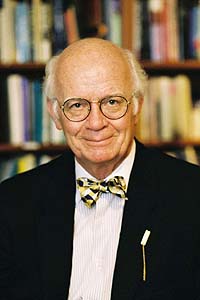![[Chronicle]](/images/sidebar_header_oct06.gif)
Vol. 26 No. 14
current issue
archive / search
contact
Past Opine interviews:
Lauren Berlant
Stephen Berry
John Boyer
David Cohen
Jerry Coyne
John Cunningham
Richard Epstein
John Frederick
Henry Frisch
Austan Goolsbee
Bernard Harcourt
Greg Jackson
Martin Marty
Martha Nussbaum
Raymond Pierrehumbert
José Quintáns
Jan-Marino Ramirez
Saskia Sassen
William Sewell
Herman Sinaiko
Geoffrey Stone
Cass Sunstein
Simon Swordy
Opine: Martin Marty
This week, Martin Marty, the Fairfax M. Cone Distinguished Service Professor Emeritus in the Divinity School, answers The Chronicle’s Opine questions, which have been answered by other faculty members since October 2006, when Opine debuted.
 Martin Marty | |
What book should every person read and why?
Augustine’s Confessions, the first, they say, and best, I say, “Western” autobiography. Publisher William Sloan advises authors of memoirs: “Readers do not say, ‘Tell me about you.’ They say, ‘Tell me about me, as I use you as a mirror and measure.’ ” Readers can be against everything Augustine is for, as many contemporaries are, and yet will learn something because of the psychological depth and cultural probing in this pioneering work of a genius.
If you could meet any scholar, author, composer, musician or entrepreneur—dead or alive—who would it be and why?
Scholar-theologian-martyr Dietrich Bonhoeffer—he was important after World War II, as I was in search of a vocation, and I return to him now, as he is coming forth in 16 translated volumes. Why Bonhoeffer? He was, oxymoronically, a Lutheran pacifist, something I’d like to have been, an activist in the resistance to Nazism, a martyr, which I could never be, and a provocative theological thinker.
Among the complex moral and political issues that affect humanity, which do you believe will never be resolved and why?
War is the consuming moral and political issue, one which, when it is on the table, sucks up the oxygen. Reading former colleague William McNeill in Daedalus (Winter, 2007), it became clear to me once more that violence is a constant in human interactions. Whether this is so because we might be descendants of an especially violent pre-human ancestor, or because of “original sin,” or lust for territory or property, humans have no more of a handle on the eradication of war today than they did thousands of years ago.
If politicians had to pass an exam before they were allowed to serve in public office, what question would you add to the test?
Do you have a vocation to human service and, if so, how would you exercise your responsibility to be a steward of what belongs to others?
If you could choose any three University professors and give them a one-year sabbatical together to solve a problem, develop a theory or make a discovery, who would they be and what task would you assign them?
If they had a thousand-year sabbatical, I’d like them to discover what it is about religion-spirituality-faith that it can lead the same people to heal and to kill. Since they only get one year for that sabbatical, I’d still ask them to seek and provide new angles of vision on the question.
Think of a renowned scholar from the past who added great value to your area of study. What would this person think of the advances that recently have been made in this field?
Jacob Burckhardt (1818-97) of Basel, Switzerland, is currently out of favor, which is a good sign that he is likely to be rediscovered soon. I taught on the Committee on the History of Culture and spent many hours with the lamented Karl (“Jock”) Weintraub pondering how to treat “history” and “culture” in light of his clues. Today, we are taught to generalize less, to draw closer to the particulars and not to try to fit them together, yet there is also a hunger to make sense of things we too readily point to, as he did—such as “Renaissance.” If I could save only one sentence of his, it would be that which follows his rejection (for historians) of “the philosophy of history,”—a “centaur, a contradiction in terms, . . . So: We shall start out from the one point accessible to us, the one eternal center of all things—[the human], suffering, striving, doing, as he is and was and ever shall be.”
What building on campus do you think is the most interesting architecturally and why?
The Robie House, a work of genius (and problems for those who use it), the best of Frank Lloyd Wright’s Prairie House style. Few buildings are by themselves architecturally all that interesting. It is the complex of the gray “Gothic” edifices, sometimes in harmony, sometimes juxtaposed with “modern” examples that impress. If they had a voice, they would unite in shouting boos at the Administration Building.
Will a liberal arts education remain relevant to students in our increasingly technological society? Why or why not?
A liberal arts education is hugely relevant in our technological society. One can pick up skills for most or at least many complex and demanding tasks in a year or maybe three of graduate work. (Medicine takes longer). A good liberal arts education stimulates wonder combined with conversation—the things, which, when lacking, leave us sterile or solipsistic.
How will the next generation of scholars—today’s students—change your field in the decades to come?
Today’s students and younger colleagues have already changed our field, my field, which is American religious and cultural history. They are creatively skeptical of “meta-narratives,” discernible and non-invented plots that hold the stories together. So, they do marvelous close ups of what my generation often overlooked. I read them with delight and, if I permitted myself envy, would be envious of their challenges and opportunities. Yet, I also suspect that they are beginning to find, almost inevitably, that their stories connect with each other and, taken together, illuminate more of the social skeins and cultural plots about which most are skeptical today.